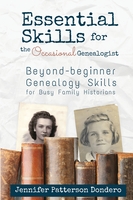This page is still under construction. I'd love if you'd recommend your favorite book, article (including blog posts), lecture, webinar, or course by leaving a comment. I'll be updating this page with more specific recommendations soon, but it helps me to go ahead and have it out there.
Welcome!
Here are some quick suggestions if you're looking for something to read (or a class/lecture to take) that will help you further your knowledge about genetic genealogy (that's using DNA for genealogy).
Note: I am only using three levels of experience below, "beginners," "transitional" (that means transitioning between beginner and experienced, i.e. in-between or intermediate---which we often think of as something more than "in-between"), and experienced.
Once you go beyond a beginner level, you will have some skills that you are starting with (but aren't skills a beginner learns) and some skills that are more advanced. I'm not getting that specific. If you've mastered the basics, consider either of the other two lists. Using a resource that is too advanced (once you have your feet wet) will show you what you need to aim for.
If you've tested at MyHeritageDNA and use that site a lot, you may want their family tree software.
Welcome!
Here are some quick suggestions if you're looking for something to read (or a class/lecture to take) that will help you further your knowledge about genetic genealogy (that's using DNA for genealogy).
Note: I am only using three levels of experience below, "beginners," "transitional" (that means transitioning between beginner and experienced, i.e. in-between or intermediate---which we often think of as something more than "in-between"), and experienced.
Once you go beyond a beginner level, you will have some skills that you are starting with (but aren't skills a beginner learns) and some skills that are more advanced. I'm not getting that specific. If you've mastered the basics, consider either of the other two lists. Using a resource that is too advanced (once you have your feet wet) will show you what you need to aim for.
Software for Creating and Using a Family Tree
(These programs may sync to an Ancestry.com tree, which can be linked to your DNA results. Using a separate software, you'll get additional features like being able to merge whole trees or add branches to your tree, as well as many traditional research benefits of using genealogy software).- LegacyFamilyTree.com for the free or paid version of the software
- RootsMagic Essentials (the free version of the software)
- free RootsMagic app for your phone (also requires the software)
- full (not free) RootsMagic software
- Family Tree Maker
If you've tested at MyHeritageDNA and use that site a lot, you may want their family tree software.
For Beginners
- The Family Tree Guide to DNA Testing and Genetic Genealogy - This guide is easy to read and covers more than just autosomal DNA (atDNA---the type that is currently the most common. Only FamilyTreeDNA offers the other two types of tests which are YDNA and mtDNA. If you don't know what you took, it's almost surely autosomal DNA). This will help you as a beginner but also be useful once you're in the transitional stage (and you can come back to it once you're experienced when you've forgotten a term or want to start using another type of DNA).
- FamilyTree Webinars (from Legacy Family Tree) - great webinars on all genealogy topics, including DNA.
- Institute of Genealogy and Historical Research (IGHR) - starting in 2019 a beginning level DNA course is scheduled as one of the courses that is taught every year. Intermediate and Advanced DNA are scheduled as alternating courses (see sections below)
- Salt Lake Institute of Genealogy (SLIG) - In 2019 "Introduction to Genetic Genealogy" is being offered. Offerings change each year so check back later to learn about other offerings.
- Genealogical Research Institute of Pittsburgh (GRIP) - GRIP offers multiple sessions each year so it's simpler for me to tell you to check their website (I'll never manage to keep everything up to date!).
For Transitional Genetic Genealogists
- Genetic Genealogy in Practice - this is part of the NGS series. If you're familiar with Mastering Genealogical Proof, you'll be familiar with the layout. It includes exercises and is NOT a beginner guide. If you want to test your skills and take them to the next level, this is the book for you.
- FamilyTree Webinars (from Legacy Family Tree) - great webinars on all genealogy topics, including DNA.
- Genealogical Research Institute of Pittsburgh (GRIP) - GRIP offers multiple sessions each year so it's simpler for me to tell you to check their website (I'll never manage to keep everything up to date!).
- Institute of Genealogy and Historical Research (IGHR) - the intermediate level course is being offered in 2018 but has a waiting list. Currently, IGHR has scheduled this course again in 2020 but this could change so check the website when you are planning (don't wait until just before registration to check!).
For Experienced Genetic Genealogists
- Genealogical Research Institute of Pittsburgh (GRIP) - GRIP offers multiple sessions each year so it's simpler for me to tell you to check their website (I'll never manage to keep everything up to date!).
- Institute of Genealogy and Historical Research (IGHR) - the advanced level course is being offered in 2019 and is scheduled to be offered again in 2021. Double check the website well before registration to confirm offereings have not changed.
Third-Party Genetic Genealogy Tools I Love
These don't easily fit into a knowledge level (since they're tools, not education). However, using these tools often helps you determine what else you need to learn so I believe they should be mentioned on this page.
- DNA Painter - This FREE tool is sooooo easy to use. That's how it got mentioned first. It probably has the least learning curve but may not make sense to a complete DNA newbie.
- GEDmatch - GEDmatch is also free but also offers paid premium tools (called "Tier 1"). This is a legitimate site (a question I often get asked by new genetic genealogists). Everyone should upload to GEDmatch (OK, there are some exceptions but you're not likely one of them). If you tested at AncestryDNA, you'll have to upload to GEDmatch to use DNA Painter. You will NOT need the paid tools while you are a beginner because there is a steep learning curve because the provided tools are so extensive.
- DNAGedcom - There are some ways this site is like GEDmatch but it's not an alternative to it. Unlike GEDmatch, not everyone will benefit from using it and initially it's focus was for people who tested at FamilyTreeDNA. However, they have expanded but it's not easy to quickly describe who will benefit most from this site. There are links on the homepage to answer that question! Like GEDmatch, they also are free with some additional paid tools.
- MedBetterDNA - This is a Chrome extension for AncestryDNA. That means you need to have tested at AncestryDNA and be using the Chrome browser or this extension won't help you! That being said, I've found it an amazing help for working with AncestryDNA. So much so, I've been able to adjust my course, Overcoming AncestryDNA Overwhelm, to feature a non-spreadsheet option using this extension.
- RootsFinder - This is an online site that's like genealogy software (or like the family tree features of subscription sites like Ancestry.com and MyHeritage). It has lots of non-DNA options but also features easy to use DNA features. The DNA features are part of their paid service to help them further develop them. It's early days for that as I'm writing this but right now, I've found the DNA tools much faster to use than similar options (and therefore easier to use because you aren't waiting and waiting to make updates). This could change as they expand but I recommend learning more if you're looking for ways to integrate DNA and an actual family tree.









